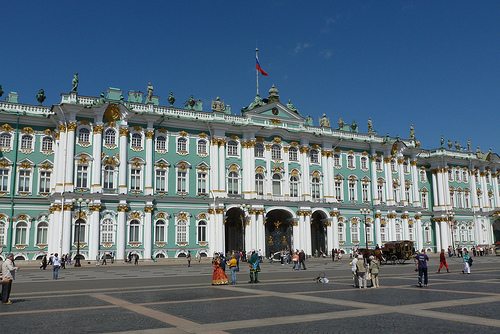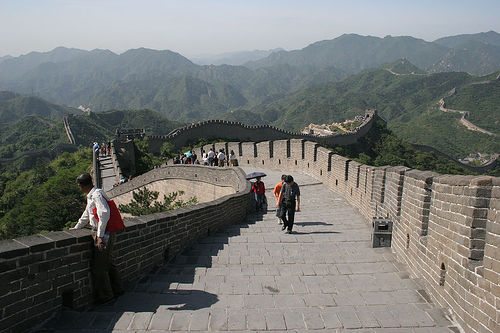The Silk Road is historically fascinating- a network of routes dating back over two thousand years that were central to trade between the West and East. The scenery itself resembles silk; stretches of land that reaches out for miles and miles over mountains and deserts, interspersed with cities that appear to rise as though from dust.
My chance to travel there came in the form of the Vodkatrain. It is not, as you might suppose, a sleek glass train where you are served shots of vodka (which would be amazing, by the way) but a series of trains that take you through Russia, down to Mongolia and through to Beijing throughout the course of 21 days.
The Beginning
My friend and I began our journey in St Petersburg, where we met our group and our first Honcho (a guide assigned to you by Vodkatrain at each destination to answer pretty much any question you can think of). After the meeting we set out together to explore St Petersburg. It was a fabulous start to the journey: a gorgeous city, brimming with some of the most stunning examples of baroque and neo-classical architecture, not to mention St Issac’s Cathedral, which you should look at last because that thing will blind you.
From the opulent beauty of St Petersburg we left for the huge, modern Moscow and took in as much of the city as possible before catching our next train. I have to say that, with more money, I could have spent several days in St Petersburg and Moscow, and, with even more money, would have attended several performances at the legendary Mariinsky and Bolshoi Opera Houses (I managed to convince my group to go with me to both buildings before they pulled me away to the nearest bar).
But our train was waiting and, by the time we boarded, armed with visas and vodka, we were buzzing with excitement and, as it turned out, there were many good times ahead.

The Train
I love this method of travel. There is something magical about watching the landscape changing from your window; it really gives you a perspective on the vastness of the land you cover. The trains were comfortable and combined group members with local travellers: we got chatting to really interesting people.
I found the cheapest way to eat on the train was to buy food from people at the various train platforms you will stop at (you can budget around £2.50- £7 per meal).
The Accommodation
All the accommodation was arranged by Vodkatrain. My favourite places were: Tatania’s guesthouse, a Siberian wooden chalet at Lake Baikal, where the host cooked us delicious Russian food; and the Ger camp in Mongolio, which was brilliant- definitely the best accommodation we stayed in.

The Highlights
Of course St Petersburg- one of the places that I definitely want to return to- left a lasting impression. The train itself was a lot of fun and the day we all went swimming in Lake Baikal (which was freezing). Each of our destinations were very interesting, made more so by some really great Honchos. By the time we got to Beijing I was sad that it was all coming to an end, but Beijing is a fantastic city and was a hugely enjoyable finish to the tour. We ate some of best food I’ve ever tasted; we found lots of places to shop; and we met some wonderful local people. The city is also home to some magnificent landmarks, including the tranquil Temple of Heaven, the vast Forbidden City, and, of course, the Great Wall of China (which we ended up walking for far too long because no-one wanted to be the person who suggested turning back).
Although we were exhausted by the end of the 21 days, and we were very hungover at points during the 21 days, there is no doubt that this experience- hilarious and beautiful in equal measures- is not one that any of us will forget in a hurry.
You can find out more about Vodkatrain here.
There are six ‘small group adventures’ to choose from depending on your interests, time scale and budget (prices range greatly from £2,380 for ‘The Cossack’ and £945 for the ‘Budgeting Bolshevik’). The website will give you a good idea of how much you should be budgeting for food and entrance fees in each city.


Comments